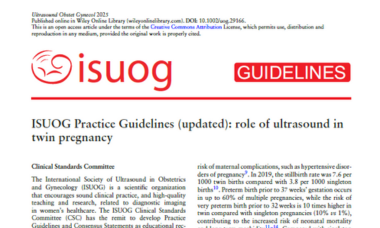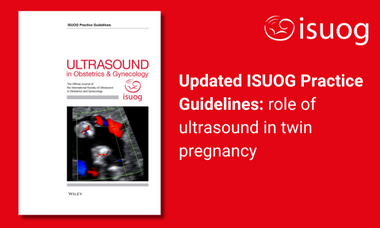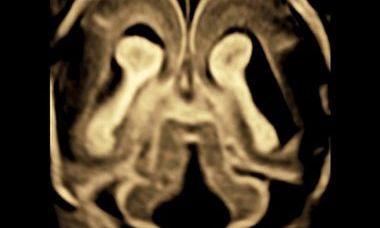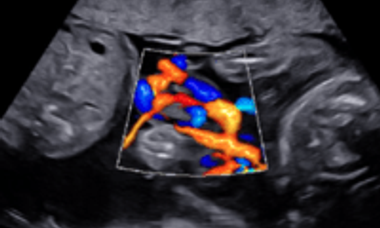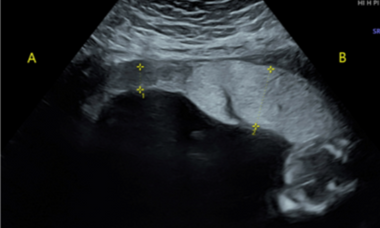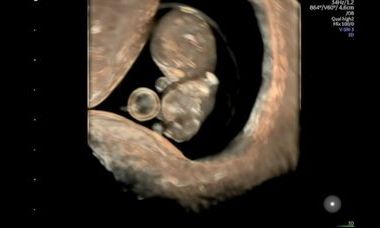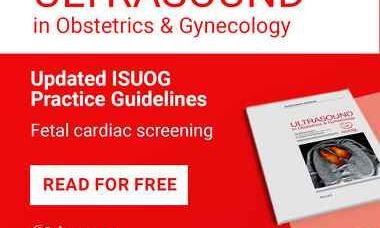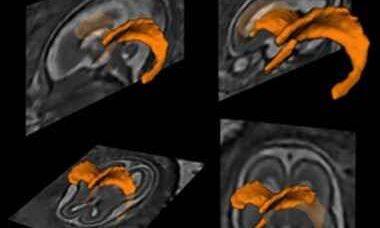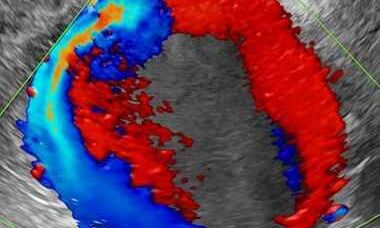January 2026 UOG Highlights
The January issue of Ultrasound in Obstetrics & Gynecology includes a meta-analysis evaluating the use of transvaginal ultrasound for diagnosing parametrial involvement in deep pelvic endometriosis, a retrospective study comparing the use of intertwin estimated fetal weight discordance vs singleton and twin fetal growth charts for predicting adverse perinatal outcomes in twins, a paper assessing the effectiveness of the first-trimester anomaly scan, and a prospective study examining the efficacy of a multimodal sonographic approach compared with transvaginal ultrasound for endometrial assessment in abnormal uterine bleeding.
December 2025 UOG Highlights
The December issue of Ultrasound in Obstetrics & Gynecology includes an observational cohort study assessing the neurodevelopmental outcomes of uncomplicated monochorionic diamniotic twins, a systematic review evaluating the use of twin vs singleton growth charts for identifying small-for-gestational-age fetuses at risk of adverse neonatal outcomes, a study investigating the performance of non-invasive prenatal testing in vanishing-twin and multiple pregnancies, and a prospective cohort study examining the prevalence of LAM avulsion after forceps-assisted and vacuum-assisted deliveries.
September 2025 UOG Highlights
The September issue of Ultrasound in Obstetrics & Gynecology includes a systematic review evaluating the impact of endometrial thickness on the reproductive outcomes of embryo transfer treatments, a cost-utility analysis modeling the clinical and economic impact of cervical-length screening strategies among twin pregnancies, a study on the association between adverse perinatal outcome and the recent parvovirus B19 infection upsurge, a study comparing the diagnostic accuracy of sonography-based risk models in assessing pediatric adnexal lesions, and a ‘How To’ article on the 20 + 2-planes method.
Updated ISUOG Practice Guidelines: role of ultrasound in twin pregnancy
This guidance will address the role of ultrasound in the care of uncomplicated twin pregnancies and those complicated by TTTS, selective FGR (sFGR), twin anemia–polycythemia sequence (TAPS), twin reversed arterial perfusion (TRAP) sequence, conjoined twins and single intrauterine death (IUD).
Newly updated ISUOG Practice Guidelines: role of ultrasound in twin pregnancy
Read the newly updated ISUOG Practice Guidelines on the role of ultrasound in twin pregnancy.
December 2024 UOG Highlights
The December issue of Ultrasound in Obstetrics & Gynecology includes a systematic review on the management and outcome of fetal abdominal cyst in the first trimester, a Danish cohort study on the validation of Fetal Medicine Foundation charts for fetal growth in twin pregnancies, a study comparing biparietal diameter vs crown–rump length for late first-trimester pregnancy dating and a pilot study evaluating the use of the two-step International Ovarian Tumor Analysis group strategy for classifying adnexal masses identified in pregnancy.
VISUOG Chapter on Chorionicity and Amnionicity in Multifetal Pregnancies is Free to Access Throughout October
Multiple pregnancies account for 2-3% of live births and involve the presence of more than one fetus in the uterus, presenting unique challenges for both maternal and fetal health. Chorionicity refers to the number of placentas, while amnionicity describes the number of amniotic sacs.
VISUOG Chapter on Twin Anemia Polycythemia Sequence (TAPS) is Free to Access Throughout September
Twin Anemia Polycythemia Sequence (TAPS) is a relatively rare but potentially severe fetal condition that occurs in monochorionic twin pregnancies.
A Trio of Webinars in Multiple Languages
This autumn, ISUOG (International Society of Ultrasound in Obstetrics and Gynecology) will host a series of webinars in various languages aimed at engaging healthcare professionals involved in ultrasound who speak Portuguese, French, and/or Spanish.
April 2024 UOG Highlights
The April issue of Ultrasound in Obstetrics & Gynecology includes a systematic review on the diagnostic performance of prenatal ultrasound in coarctation of the aorta, a nationwide cohort study on the outcome of multifetal reduction in quadruplet pregnancy, a study validating the IETA-1 model for intracavitary uterine pathology in women without abnormal uterine bleeding and a summary of the findings of a systematic review on cervical cerclage in twin pregnancy.
February 2024 UOG Highlights
The February issue of Ultrasound in Obstetrics & Gynecology includes a systematic review evaluating adverse perinatal outcome in dichorionic twin pregnancy complicated by selective fetal growth restriction, a study deriving chorionicity-specific reference ranges for fetal growth in twin pregnancy, an analysis of emergency Cesarean delivery in placenta previa and placenta accreta spectrum and an evaluation of the diagnostic test accuracy of a standardized transvaginal examination for deep endometriosis of the uterosacral ligaments and torus uterinus.
January 2024 UOG Highlights
The January issue of Ultrasound in Obstetrics & Gynecology includes a systematic review exploring the value of whole-genome sequencing in the diagnosis of congenital anomalies, a randomized controlled trial investigating the utility of visual biofeedback during the second stage of labor in facilitating maternal pushing, a study on the diagnosis of superficial endometriosis using transvaginal ultrasound, and a study demonstrating the potential of deep learning in improving fetal heart screening. This issue also features the new ISUOG Practice Guidelines on the performance of third-trimester obstetric ultrasound scan.
November 2023 UOG Highlights
The November issue of Ultrasound in Obstetrics & Gynecology includes a systematic review evaluating the incidence of urological complications in women undergoing Cesarean section for placenta accreta spectrum disorders, a study proposing a new marker to facilitate identification of fetuses with agenesis of the corpus callosum, and two studies providing evidence of an association between epidural analgesia and increased risk of emergency delivery for fetal compromise. The potentially significant impact of the findings of the latter two studies are countered in an accompanying Editorial by Cavoretto and colleagues and in a series of Correspondence articles.
October 2023 UOG Highlights
The October issue of Ultrasound in Obstetrics & Gynecology includes a systematic review evaluating the incidence and predictive factors of obstetric anal sphincter injury in primiparous women, a study providing preliminary evidence supporting the feasibility and efficacy of prenatal open spina bifida repair in twin pregnancy and two studies assessing the utility of glycosylated fibronectin as a new biomarker for pre-eclampsia screening in mixed and Asian populations. The issue also features a study demonstrating the efficacy and safety of in-utero treatment of sustained fetal supraventricular arrhythmia in late preterm and term fetuses and an accompanying Editorial on the topic.
Newly updated ISUOG Practice Guidelines: performance of fetal cardiac screening
Read the newly updated ISUOG Practice Guidelines on the performance of fetal cardiac screening.
September 2023 UOG Highlights
The September issue of Ultrasound in Obstetrics & Gynecology includes a systematic review examining the impact of concurrent selective fetal growth restriction on the outcome of pregnancies with twin–twin transfusion syndrome following laser surgery, a study investigating the prevalence, pathophysiology and impact of a midline cystic structure recently reported in some fetuses with open spina bifida, a prospective study aiming to determine the best strategy for prediction of hypertensive disorders at 36 weeks’ gestation, and a large study of 25,329 patients evaluating the effect of reproductive history on the outcome of in-vitro fertilization.
Early bird registration fees end soon
Don't miss your chance to get reduced registration fees for our flagship World Congress event in Seoul this October. There are only two weeks left to register before the early bird deadline on August 16th.
August 2023 UOG Highlights
The August issue of Ultrasound in Obstetrics & Gynecology includes a systematic review of studies developing reference charts for fetal biometry of the corpus callosum, a large study investigating the implication of third-trimester screening accuracy for small-for-gestational age and additive value of third-trimester growth-trajectory indicators in predicting severe adverse perinatal outcome in low-risk pregnancies, a study on diagnostic sonographic features and management of intramural pregnancy, and a study proposing markers for first-trimester prediction of ventriculomegaly.
May 2023 UOG Highlights
The May issue of Ultrasound in Obstetrics & Gynecology includes a systematic review investigating the outcome following early vs late selective termination in dichorionic twin pregnancies, a prospective study aiming to estimate the prevalence of endometriosis using transvaginal ultrasound, a study proposing new criteria for predicting outcome in cases of tricuspid valve dysplasia and Ebstein’s anomaly using fetal tricuspid regurgitation waveform analysis, and a large prospective midgestation study examining cardiac function and morphology of fetuses conceived via in-vitro fertilization. The May issue also features a randomized controlled trial evaluating the impact of predictive information regarding the likely outcome of pregnancy on psychological wellbeing of women with a pregnancy of uncertain viability during the waiting period to final diagnosis.
April 2023 UOG Highlights
The April issue of Ultrasound in Obstetrics & Gynecology includes a systematic review evaluating the safety and effectiveness of prenatal valacyclovir therapy in prevention and treatment of congenital cytomegalovirus infection, a large population-based study investigating the link between birth-weight centile and school performance, a prospective longitudinal study providing reference ranges for uterine artery pulsatility index across gestation and a Delphi consensus study focusing on ultrasound in the prenatal evaluation and management of patients at high risk of placenta accreta spectrum at delivery.




